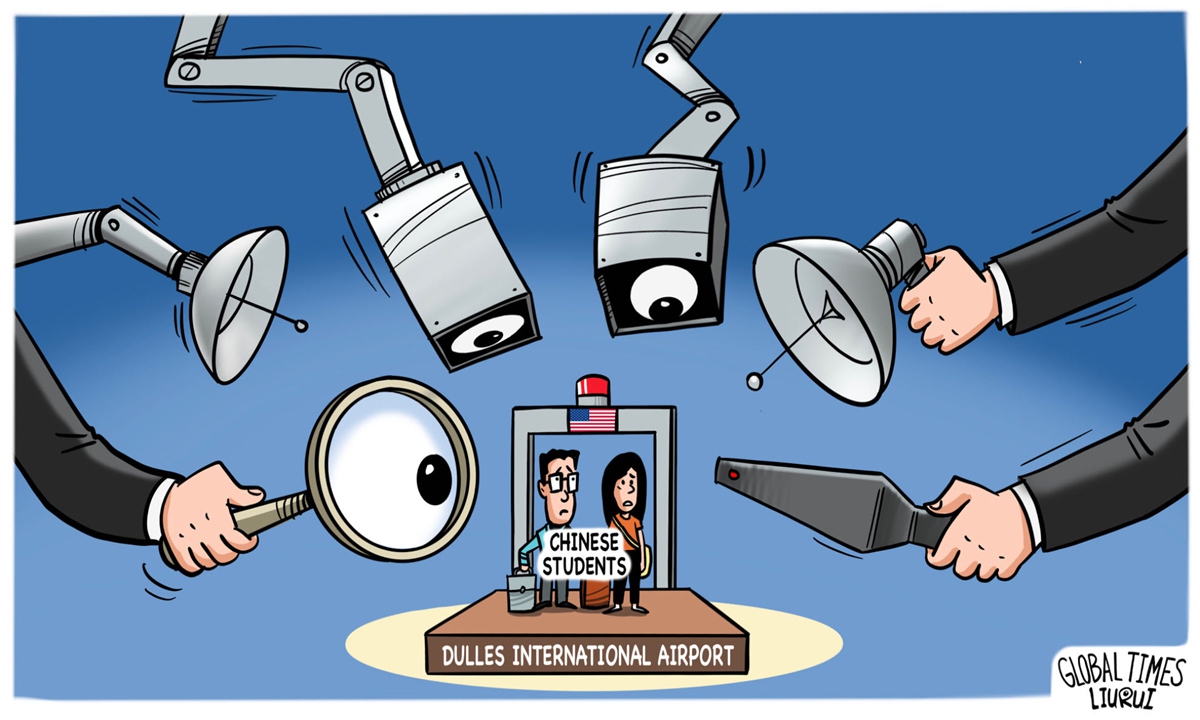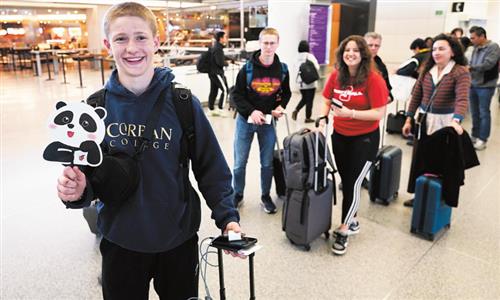
Illustration: Liu Rui/GT
Incidents concerning Chinese students being locked up in "small black rooms" at the US airports are still ongoing, and now Chinese official delegations visiting the US for exchange programs are also being targeted. A Chinese delegation that went to the US for an exchange program was recently harassed at a US airport for no apparent reason. The frequent occurrence of such incidents will hinder the normal cooperation, and impede the stable, healthy and sustainable development of China-US relations.At US airports, especially Washington Dulles International Airport, there have been frequent cases of Chinese students being repatriated in recent months. The discriminatory law enforcement in Washington has even caught the attention of the US media. The Washington Post recently published an article titled "Chinese students, academics say they're facing extra scrutiny entering US," detailing the experiences of six Chinese students and two visiting scholars who were being questioned upon landing in the US about their research, families and any possible connection to Communist Party of China. Two of them, their visas canceled, were immediately repatriated. While leaders from both sides reached a series of agreements during their meeting in San Francisco in November last year, the people-to-people exchanges, which should have progressed smoothly, have encountered a "roadblock" of inspections and deportations. However, US law enforcement agencies are not willing to listen to any criticism and they continue to act at free will.
The latest victims are two Chinese doctoral students studying in the US. One of the students, who arrived at Dulles Airport in early March with a student visa, was detained for 28 hours by US law enforcement officers. They conducted two rounds of questioning totaling five hours, confiscated and checked all of the student's belongings and electronic devices, repeatedly asked about his political affiliations as well as his parents' political affiliations. They also asked him whether he received funding from relevant government agencies during his undergraduate and graduate studies. Ultimately, they canceled his visa on the spot on the grounds that the student had immigration tendencies, and told him that he would not be allowed to enter the US for five years. Similarly, another doctoral student was deported in mid-March at Philadelphia International Airport.
The hypocrisy of Washington lies in the fact that, on the one hand, it boasts about "openness" and "freedom," repeatedly stating that it values "people-to-people exchanges" and "welcomes Chinese students." On the other hand, it politicizes people-to-people exchanges and educational cooperation, abruptly interrupting the academic pursuits of Chinese students and arbitrarily altering their plans. Are the human rights of Chinese students important for American political elites? The answer is clearly no.
Washington should be clear that young people from other countries studying in the US are not a US' charity to the world, but a valuable opportunity given to the US by the world. The former open and confident US has now become closed, conservative and suspicious, no longer resembling what a great power should be.
If US hegemony is not restrained, it will become more and more rampant. Informed sources revealed that, recently, a delegation from a major Chinese agricultural province was invited to the US to carry out agricultural cooperation and sister city exchanges. However, this mutually beneficial, friendly exchange and cooperation between China and the US was deliberately disrupted. Upon learning that the delegation was from China, US airport law enforcement officers immediately took all members to the "small black room" for individual harassment and interrogation. US law enforcement officers inquired in detail about the delegation's purpose of visit, specific contacts and checked the checked baggage and carry-on luggage of each member of the delegation. After repeated checks, the US finally allowed the delegation to pass.
Agricultural cooperation has always been a highlight of China-US cooperation, and agricultural trade is one of the closest related areas of economic ties between China and the US. China is an important destination for US agricultural exports, and US farmers and exporters are eager to engage in more agricultural trade with China. The US Ambassador to China, Nicholas Burns, has also stated that the economic and trade ties between the two countries are extraordinarily important, agriculture is one of the most successful aspects of their relationship. Chinese local government delegations come with the greatest sincerity. However, they are received with such a "welcome gift" from the US before even entering the country. If US government delegations were treated unfairly overseas, how would they feel?
Civil and cultural exchanges have always been an important part of China-US relations and the driving force behind the development of the relationship between the two countries. Once the door to China-US relations is opened, it will not be closed again. Every important moment in China-US relations cannot be separated from the two-way efforts of the people of the two countries. The "small black room" incident at US airports goes against the tide of history. The US should recognize the overall trend of historical development, objectively and rationally view China's development, and actively and pragmatically engage with China. The US should respond to the expectations of the people of both countries through practical actions and actively promote local cooperation and cultural exchanges between the two countries rather than creating artificial obstacles.
The author is an international affairs observer. opinion@globaltimes.com.cn


